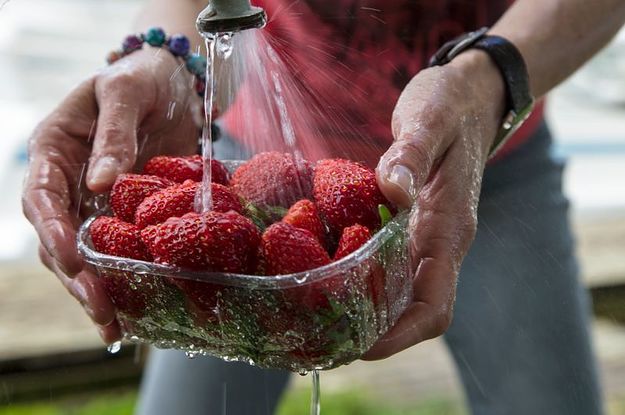In addition to removing leftover bits of soil and errant garden bugs from delicious summer fruits and vegetables, many of us want to make sure that we’re clearing away residual pesticides, too. TikTok has popularized a trend of washing fruits and vegetables in baking soda, white vinegar and specialty “produce washes,” but is that really the best method?
We found ourselves wondering: What are the actual risks of consuming pesticides on produce? Do you really need to wash fruits and veggies in special formulas to get them clean? Can all types of produce be washed the same way?
To answer these questions, we turned to experts who know a thing or two about summer produce and pesticides.
Pesticides have been linked to serious ailments, but the proof is not always clear.
“There are many different types of pesticides, and the human effects of ingesting these chemicals can vary based on the type of pesticide,” said Dr. Kelly Johnson-Arbor, medical toxicology physician and medical director at National Capital Poison Center in Washington, D.C. “Some pesticides can cause neurologic damage, while others are associated with chronic health conditions such as cancer.”
Other concerns related to pesticides include “effects on reproduction or development,” often called endocrine disruption, Johnson-Arbor said.
These concerns cause many people to avoid unnecessary exposure to pesticides. The Environmental Protection Agency says “people are likely to be exposed to only very small amounts of a pesticides — too small to pose a risk.” In many cases, Johnson-Arbor said, “the exact dose and timing of exposure needed to cause these harmful human health effects remains unknown.” If you’d rather steer clear of pesticides on your produce, you’re not alone. Below, you’ll find expert advice for getting your summer produce haul close to pesticide-free.
Regular tap water is the best cleaner for fruits and vegetables.
The good news for the budget-minded among us is that, in Johnson-Arbor’s professional estimation, the water right from your faucet will clean produce quite effectively.
“Plain running tap water remains the simplest and safest method” of removing germs and pesticides from produce, Johnson-Arbor said.
The Centers for Disease Control and Prevention and the Food and Drug Administration both recommend washing produce with running water and not other solutions, including vinegar or commercial produce washes.
Don’t use soap, detergent or store-bought “produce wash.”
Fruits and vegetables are absorbent by nature, so it’s generally not recommended to use any type of soap, detergent or cleaning solution on them.
“According to the FDA, washing fresh produce with soap, detergent or commercial produce wash is not recommended, as their safety and effectiveness have not been adequately tested,” explained Emma Laing, the director of dietetics at the University of Georgia. “Because produce is porous, soaps and detergents can be absorbed even with thorough rinsing, and this can lead to illness.”
Resist the urge to soak your produce.
Soaking fruits and vegetables in clean water might seem like an effective way to deep clean it prior to eating. While it may help to remove pesticide remnants from the surface of produce items, Johnson-Arbor warned against this method because “it can actually lead to an increased spread of germs through the soaking water, causing a higher level of contamination.”
Johnson-Arbor added a warning about letting washed produce touch your sink: “Your sink is dirtier than you think!”
Source: https://www.buzzfeed.com/taylortobin/how-to-wash-pesticides-off-fruits-and-vegeatbles-7517545
